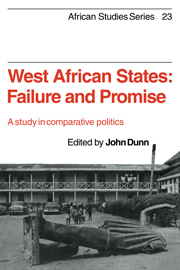7 - Senegal
Published online by Cambridge University Press: 19 January 2010
Summary
Any form of multi-party political life, in a West African state today, is obviously enough of an oddity to arouse at least some curiosity in a student of political affairs in the region. The peculiar circumstances by which new constitutional amendments were adopted (in April 1976) to ‘re-animate party politics’ in Senegal, by providing for the creation of a tripartite political system, should re-awaken even the most jaded observer. The revised constitution decrees that there should henceforth be three political parties in Senegal, each to work within a constitutionally defined ideological framework. The governing Union Progressiste Sénégalaise designates its own ideological position as ‘socialist and democratic’, leaving an allocated space for one party to its right (‘liberal and democratic’) and another to its left (‘Marxist–Leninist or communist’, as the constitution bluntly stipulates). The deliberate (and of course presidentially inspired) creation of a legal communist opposition party, is an oddity not only in West African terms but indeed by any international standards.
Elsewhere in the West African region the political trend over the past fifteen years has of course been moving firmly away from multi-party electoral competition: towards single-party regimes with attendant presidentialist quasi-dictatorships, military coups with consequent soldierly dictatorships. Such changes of regime have on the whole been accompanied by an enduring fragility of political authority with more or less latent communal strife behind an unconvincing institutional facade of national unity.
- Type
- Chapter
- Information
- West African States: Failure and PromiseA Study in Comparative Politics, pp. 173 - 188Publisher: Cambridge University PressPrint publication year: 1978
- 5
- Cited by

